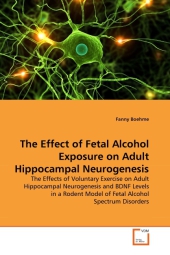 Neuerscheinungen 2011Stand: 2020-01-07 |
Schnellsuche
ISBN/Stichwort/Autor
|
Herderstraße 10
10625 Berlin
Tel.: 030 315 714 16
Fax 030 315 714 14
info@buchspektrum.de |

Fanny Boehme
The Effect of Fetal Alcohol Exposure on Adult Hippocampal Neurogenesis
The Effects of Voluntary Exercise on Adult Hippocampal Neurogenesis and BDNF Levels in a Rodent Model of Fetal Alcohol Spectrum Disorders
2011. 92 S. 220 mm
Verlag/Jahr: VDM VERLAG DR. MÜLLER 2011
ISBN: 3-639-31680-0 (3639316800)
Neue ISBN: 978-3-639-31680-3 (9783639316803)
Preis und Lieferzeit: Bitte klicken
Alcohol consumption during pregnancy is detrimental to the developing nervous system of the unborn offspring. The hippocampus is particularly sensitive to the teratogenic effects of ethanol. Thus, prenatal ethanol exposure has been shown to result in both hippocampal malformation and impaired performance on hippocampal-dependent learning and memory tasks in rodents. The hippocampus is further one of the two brain regions where neurogenesis persists into adulthood,a process known as adult hippocampal neurogenesis. Several groups have also shown that adult hippocampal neurogenesis is compromised in animal models of fetal alcohol syndrome (FAS). However, the results obtained and the magnitude of the observed changes strongly depend on the rodent model used, as well as the dose, time, and frequency of ethanol exposure during the period of brain development. The present study we examined the effects of mild alcohol exposure throughout all three trimester equivalents on the stages of adult neurogenesis. Further this study also looks into cell signalling by analyzing the expression of Brain-derived neurotrophic factor (BDNF) a regulating factor of adult neurogenesis.
Fanny Böhme, born 1985 in Dresden. After finishing her Bachelor´s degree at the University of Applied Sciences Lausitz in Germany she started working on deficits in hippocampal function. At the University of Victoria in Canada she investigates the effects of alcohol exposure during pregnancy on hippocampal function of the offspring.


